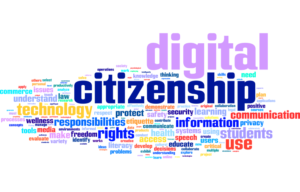My biggest accomplishments in the course were the creation of the animated video using Moovly because I found and learned a new program in a very short amount of time and created a decent project for that week’s assignment. I’m pretty app savvy, but video production is not my strong suit.
As with many of the courses in the DLL program, the time constraints of the 5-week course really limits student’s ability to digest and reflect on the content of the course. I’m sorry to say, but a majority of the students think this and it’s not meant as a slight or complaint – students in the program know they would get much more out of each course if it was just a week or two longer. I think my work could have a bit more polish to them with a bit more time. As the semester ended, the time crunch was particularly stressful for those that teach because of their professional workloads.
I’m satisfied with the work I completed in 5316. I learned the most from creating the presentations because with each assignment I chose a new program that I had not used before in order to challenge myself and to see what I could create. I’m really proud to have a solid working knowledge of Moovly after using it for only a short period of time.
I learned with this course that I need to have a specific component in my classes about digital citizenship instead of a cursory approach and not assume all students have the same knowledge about it and that digital citizenship is an ongoing process – we should also be aware of our digital footprint and always seek to improve our knowledge about it.
The most meaningful thing I learned in the course is how much we don’t know about our digital footprint and how much of our personal information is floating around. In a different aspect, addressing cyberbullying is important to me because it can have such a profound impact of people and the importance of confronting it whenever possible.
What will help me to grow as an educational leader is a desire to be aware and knowledgeable about issues concerning digital citizenship and how the dynamics of it are subject to change at any time. As a leader, I think it is especially important to be vigilant on issues of cyberbullying and convey to students that resources are available to help them.
My favorite aspect of the course is always reading research papers – I love to read, and I read very fast. I love being confronted with complimentary theories and exploring contradictory ones as well. I feel that I always have something I can learn from and apply it to what I’m doing. I’m excited because throughout this course, I have been concurrently working within the implementation of my Innovation Plan and how I’m able to directly apply every course to what I’m doing.
I would suggest to other students to take ownership of what they are doing in the course and apply it to their part of the world they work in. I love how I’ve been able to curate most of what I’ve done in the courses to my own work environment and classes. Also, not to procrastinate and start work early in the week if possible.
In this course, some of the reflective essays seemed a bit redundant and I would consider removing one or two of them, especially during week 4 and 5. I suggest replacing them with maybe a case study prompt or reflection about an article or video. Of course, more time to work on the culminating project would be good too.
I would tell my friends about how this course helps to manage your digital footprint and assists in helping us become more aware of our digital surroundings.

